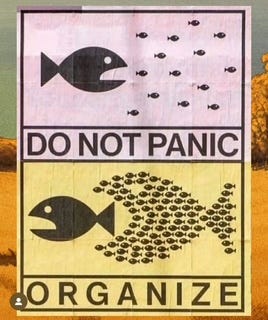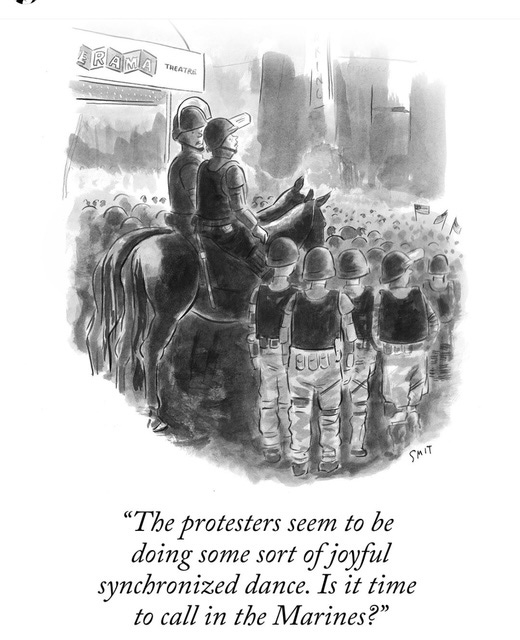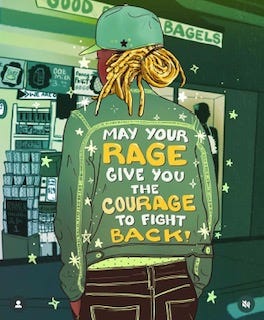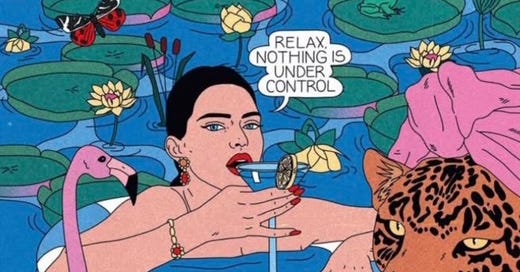Greta Was Right: The "Normal" Ones Are Acting Pretty Strange
The cognitive dissonance of normalizing the abnormal
At a 2018 TED talk, climate activist Greta Thunberg said, “I think in many ways that we autistic are the normal ones and the rest of the people are pretty strange. Especially when it comes to the sustainability crisis, where everyone keeps saying that climate change is an existential threat and the most important issue of all, and yet they just carry on like before.”
Thunberg spoke these words years ago, but her sentiment still rings true for me today. I can’t think of a better way to capture the cognitive dissonance I feel right now between the reality I'm witnessing and the way so many of us seem to be carrying on as if everything were normal.
In The Guardian article “Systems are crumbling – but daily life continues. The dissonance is real,” Adrienne Matei writes about this cognitive dissonance and feeling of dissociation—and, as one psychotherapist put it, the traumatic experience of feeling alone in this reality.
“The worst thing in the world is to feel that you’re the only one who feels this way and that you are going quietly mad and everyone else is in denial,” Caroline Hickman says. “That terrifies people. It traumatizes people.”
Continuing with life as if nothing is happening, I sometimes wonder if it’s all in my head, which, in a way, makes me gaslight myself into doubting what is real. When all you see is pretty flooring, and no one talks about the maggots under the house except for the heads on the computer/TV/smartphone screen, what is real?
Commenters of the Guardian article mention how being a parent is particularly troubling right now, having to carry on as if all is normal. I can’t talk to my family about current events, as my husband disagrees with me on politics, and my daughter, who is also autistic, gets upset listening to the news. (Who knows, maybe one day she’ll channel this justice sensitivity into activism like Greta Thunberg!)
Essentially, I'm living in an alternate reality from the rest of my immediate family. (According to my therapist, PTSD sets in when we feel alone in our trauma.)
It’s the cognitive dissonance I feel while reading an NYT article about the horrors in Gaza, interspersed with an ad for furniture that costs upwards of $5,000, sandwiched in between photos of starving children. The psychological compartmentalization required to move from that article to purchasing luxury items deeply confuses me.
The cognitive dissonance resurfaces when I think about the 212,000+ millionaires and 43 billionaires in Los Angeles who could fund bail for protesters or amplify causes through their platforms. I know some are doing this work quietly, but I wish more felt called to use their visibility for these causes. (An overwhelmingly long list of causes is detailed at 5calls.org.)
I appreciate the perspective from
, who writes:For me, the tension comes when joy is consistently shared without any acknowledgement of the parts that are burning. It’s not about turning away from joy, but about pairing it with awareness, with tending, with some kind of offering back. That’s balance. Holding joy and responsibility together.
In “The Beautiful Danger of Normal Life During an Autocratic Rise,” M. Gessen, a New York Times opinion columnist from Russia, talks about this feeling as "a very human, and in a way very beautiful, desire to normalize, to habituate, to find our footing in any situation, and to keep on living. It's sort of a great, life-affirming ability that we have, except it has a way of normalizing things that we really shouldn't live with."
The difference between their experience in Russia and what we're facing here is that this normalization arose after dictatorship became inevitable. Here in the U.S., we still have the power to fight for change. As many writers and journalists have warned, normalizing what's happening now means giving up before the fight is over—“obeying in advance,” essentially.

Everything is connected. Our future will not let go of our past.
“What will future you think?” I often ask my children. “Will future you be grateful for the choices you're making now?”
I ask myself the same question. Will future me be at peace, knowing I did everything I could? Will I be the person I admired in history books, or the person I said I would never become? Will my grandchildren look back at my grave or urn and ask: “Did she do enough? Was she one of the people trying to make a difference?”
Look at how Los Angeles is representing, coming together in community, singing and dancing, taking care of each other, and, for the most part, keeping the peace.

Los Angeles is full of artists and Latinx folks, and Latinx culture is collectivist and community-oriented. It’s a beautiful culture that I married into for eight years when my last name was Obispo, which means bishop. My friends in the SoCal Venezuelan community of San Clemente were some of the warmest, most generous folks I’ve known who would literally take the shirt off their backs for another in need.

For a long time, we’ve been living in an alternate reality from much of the world, allowing children to go hungry and needless suffering to occur while we continue to go about our pretty lives. One documentary filmmaker calls this “hypernormalization,” as depicted in the documentary film HyperNormalisation.
Now, the other reality is arriving. The logs are being rolled over, and the maggots that were always there are scattering.
poses a nuanced call-to-action:As an arts-based activist for decades, I deeply believe that not all of us are called to be warriors on the front lines of protests, or the ‘standard’ forms of showing up. There are many ways to exert pressure and resistance. I’m working on comedic acts that have proven successful with authoritarian regimes in the past. Times for trickster energy?
That trickster energy is different for everyone. Bayo Akomolafe says that trickster energy is an invitation to move beyond our comfort zones and familiar ways of being, opening us to new possibilities for connection with life's deeper mysteries and interconnectedness.
For me, it was protest through songwriting and theater. Now it’s organizing and writing speeches, articles, testimony, and, of course, this newsletter.
Not everyone will feel called to the same expressions of resistance, but each of us can ask: How do I want to show up right now? How do I want to be remembered?
Xo,
Summer <3
If you enjoyed this post and want to receive more, please subscribe, free or paid. I have to do capitalism like everyone else, and appreciate the support. If you can help support my work, thank you!
If you’re not on there already, join me on Substack Notes!






"Rage against the dying of the light."
I needed this in my inbox today. Thank you for putting words to the Upside-Down we’re all in.